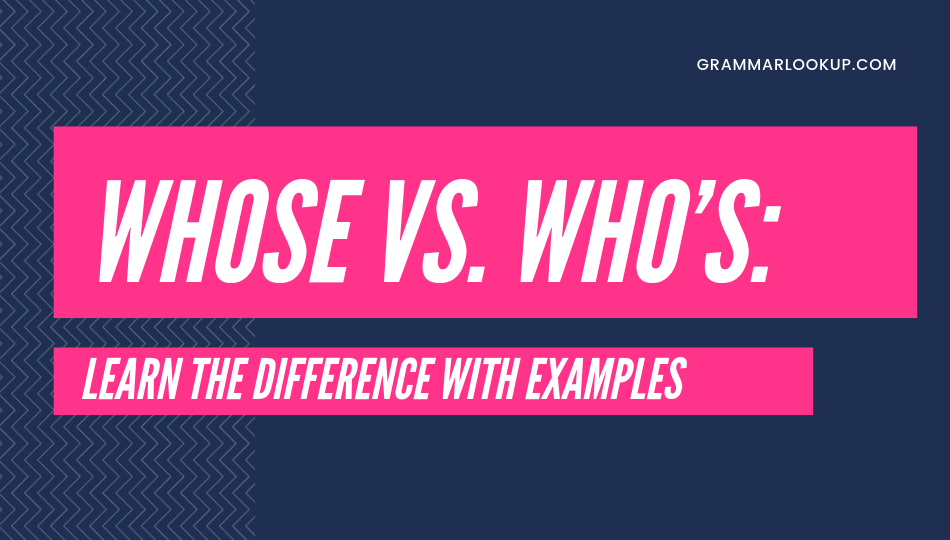Let me know if it happens to you as well:
You’re typing with speed – with a purpose to complete some written task within the given time and you start making mistakes.
One of those very common mistakes is the ‘whose’ vs. ‘who’s’ mistake.
We all know that whose means that something is belonging to someone and who’s a contraction that is used to shorten the small and very frequently used phrase ‘who is’.
However:
Since this is a mistake that many people make, we have to not only explain both (with examples), but draw a clear line of distinction between both of them.
Whose Vs Who’s
Let’s first take whose, define it when to use it with example sentences. Then Who’s turn, definition, and where to use (usage).

Here you go:
Whose Definition and Usage
As it has been explained, whose shows belonging of someone or something to someone or something, let me make the point clear.
Let us first talk about the type of word. Whose is actually a determiner. It determines or decides the nature of something or someone.
So when we say whose, it means we are talking about someone or something that belongs to a particular person or thing or similar subject.
For example:
Bicycle is a thing; it belongs to Jacob. Someone steals Jacob’s bicycle. Since the item belongs to Jacob we will say:
Whose bicycle was it?
It was Jacob’s bicycle so whose is used where we can’t or won’t use the actual owner.
Whose son are you?
Whose laptop was left open?
Whose job was that to send our clients all the KPI details?
You see, whose is used to show belonging, responsibility or possession and it is one of those ‘wh’ words that start a question e.g. which, when and why etc.
This possessive form of pronoun ‘who’ defines the noun that comes after it. So whose laptop means there is a link between ‘who’ behind the ‘whose’ and the laptop. So laptop belonged to ‘who’.
Since who is active, whose is the passive form of it. Who owns the laptop? is thus turned into whose laptop it is?
He, who and whose are different forms of same person and they can be used in the same sentence because all of them are linked to each other.
Take this sentence for example.
He is a coal miner, who has been working in the mines for his entire life and whose insurance policy states that in the event of his death his family will only get $10,000 – those too not in the case of accidental death.
You can see that the nature of the sentence was active as long as I used he and who, but whose was used only when the sentence intended to become passive.
Who’s Definition and Usage
Okay:
I’ve already stated that who’s basically just a short form of ‘who is.’
In the language of grammar, it is called a contraction – when you contract more than one word into one word.
So:
When you shorten ‘Who is’ into ‘who’s’ the meanings are not changed, they remain the same, however, the size of the phrase gets smaller and two words are contracted into one.
However:
‘Who’s’ become tricky when you see that it may mean ‘who has’ – and not ‘who is’. Since ‘s’ comes in the end of both words ‘is’ and ‘has’, this word is used for both – ‘he is’ and ‘he has’, and it’s only by using one’s brain that they get the actually intended phrase.
So here are the examples of when you may save space and time, and opt to use ‘who’s’:
Who is coming to the party?
Who’s coming to the party.
Who is the groom; never saw him before.
Who’s the groom; never saw him before.
Or:
Who has not paid the bills?
Who’s not paid the bills.
Who has been wanting to dine at the restaurant facing the sea?
Who’s been wanting to dine at the restaurant facing the sea?
As you can see, ‘who is’ and ‘who has’ have nothing in common when it comes to meanings. This contraction that they share – ‘who’s’ is only because both words end on ‘s’ sound and the purpose is only to save time and space.
So:
For ease and convenience, people often choose to say ‘who’s’ instead of ‘who is’ or ‘who has’.
This is it, folks!
I hope that you must now be able to easily differentiate between whose and who’s. Fortunately, the use and meaning of both are entirely different (not like who and whom), and thus you can easily make a difference.
It is only their sound that is the same, but I bet that after reading this post you will be able to avoid confusion.